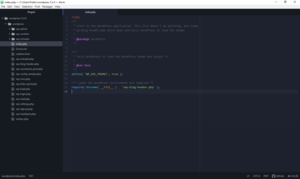Atom (text editor)
Atom is a free and open-source[7][8] text and source code editor for macOS, Linux, and Microsoft Windows[6] with support for plug-ins written in Node.js, and embedded Git Control, developed by GitHub. Atom is a desktop application built using web technologies.[9] Most of the extending packages have free software licenses and are community-built and maintained.[10] Atom is based on Electron (formerly known as Atom Shell),[11] a framework that enables cross-platform desktop applications using Chromium and Node.js.[12][13] It is written in CoffeeScript and Less.[14]
 Atom with an open project on Windows 10 | |
| Developer(s) | GitHub (subsidiary of Microsoft)[1] |
|---|---|
| Initial release | 26 February 2014[2] |
| Stable release | 1.49.0[3]
/ 14 July 2020 |
| Preview release | 1.50.0-beta0[3]
/ 14 July 2020 |
| Repository | |
| Written in | Electron (back-end), CoffeeScript / JavaScript / Less / HTML (front-end/UI) |
| Operating system | macOS 10.9 or later, Windows 7 and later, and Linux[4] |
| Size | 87–180 MB |
| Available in | English |
| Type | Source code editor |
| License |
|
| Website | atom |
Atom was released from beta, as version 1.0, on 25 June 2015.[15] Its developers call it a "hackable text editor for the 21st Century".[16] It is fully customizable in HTML, CSS, and JavaScript.[17]
History
It was able to be used as an integrated development environment (IDE),[18][19][20][21] until that feature was 'retired' in December 2018.[22]
Packages
Like most other configurable text editors, Atom enables users to install third-party packages and themes to customize the features and looks of the editor. Packages can be installed, managed and published via Atom's package manager apm. Syntactic highlighting support for other languages than the default, can be installed through the packages, as well as the auto-complete function.
Programming language support
Atom's default packages can apply syntax highlighting for the following programming languages and file formats:[23][24]
License
Initially, extension packages for Atom and anything not part of Atom's core were released under an open-source license. On 6 May 2014, the rest of Atom, including the core application, its package manager, as well as its desktop framework Electron, were released as free and open-source software under the MIT License.[26]
Privacy
There was initially concern and discussion about two opt-out packages that report various data to external servers.[27][28][29][30][31] However, those packages are now opt-in with a verbose dialog at the initial launch:[32]
- Metrics package: Reports usage information to Google Analytics (As of version 1.31.0, this has been removed, now usage information is sent to GitHub's analytics pipeline directly.[33][34]), including a unique UUID v4 random identifier.[35] According to the authors, this is to determine the performance and know the most-used functions.[6] This feature can be disabled by the user by opening the Settings View, searching for the metrics package, and disabling it.[35]
- Exception-reporting package: Reports uncaught Atom exceptions to www.bugsnag.com.[36]
See also
References
- "Microsoft's 'future CEO of GitHub' speaks out on Atom, keeping GitHub independent and more". ZDNet. Retrieved 21 June 2020.
- "Introducing Atom". Atom. Retrieved 15 August 2015.
- "Release Notes". Atom.io. Retrieved 18 July 2020.
- "A hackable text editor for the 21st Century". Atom.
- "GitHub Open Source Applications Terms and Conditions". Retrieved 12 June 2020.
- "FAQ". Atom. Retrieved 12 June 2020.
- Henry, Alan (8 May 2014). "Atom, the Text Editor from GitHub, Goes Free and Open-Source". Lifehacker.
- Lardinois, Frederic (6 May 2014). "GitHub Open Sources Its Atom Text Editor". TechCrunch.
- "Getting Started: Why Atom". Atom project. Retrieved 17 August 2015.
[...] we didn’t build Atom as a traditional web application. Instead, Atom is a specialized variant of Chromium designed to be a text editor rather than a web browser. Every Atom window is essentially a locally-rendered web page.
- "A hackable text editor for the 21st Century". Atom.
- "Atom Shell is now Electron". Atom. Retrieved 2017-07-15.
- "Atom GitHub Page". Retrieved 27 August 2015.
- "Electron GitHub Page". Retrieved 14 February 2016.
- "Hacking Atom: Tools of the Trade". Retrieved 22 February 2017.
- Ogle, Ben (25 June 2015). "Atom 1.0". blog.atom.io. Retrieved 25 June 2015.
- "A hackable text editor for the 21st Century". Atom.
- "Getting started with Atom". Codecademy.
- "Atom IDE". Atom IDE. Retrieved 2018-01-26.
- "Nuclide". Nuclide. Retrieved 2016-10-12.
- "Juno, the Interactive Development Environment". Juno. Retrieved 2016-10-12.
- "PlatformIO IDE: The next-generation integrated development environment for IoT". PlatformIO. Retrieved 2016-10-12.
- ""Facebook retires Nuclide extension"". Atom Blog. Retrieved 2019-01-12.
- "GitHub – atom/language-examples: Language examples for all Atom core languages". March 3, 2019 – via GitHub.
- "Tree-sitter|Introduction". tree-sitter.github.io.
- "atom-ide-racket". Atom.
- "Atom Is Now Open Source". Atom. Retrieved 15 August 2015.
- "Have metrics disabled by default, or completely removed". GitHub. Retrieved 3 February 2016.
- "Collecting Metrics in Atom Core". Atom. Retrieved 3 February 2016.
- "Communicate plan on how to modify metrics to be opt-in now that 1.0 is released". GitHub Atom. Retrieved 3 February 2016.
- "should be disableable during install". Atom. Retrieved 3 February 2016.
- "Should be disabled by default". Atom. Retrieved 3 February 2016.
- "Send telemetry only with consent by damieng · Pull Request #66 · atom/metrics". GitHub.
- "atom/atom". GitHub. Retrieved 2018-10-13.
- "RIP Google Analytics by annthurium · Pull Request #100 · atom/metrics". GitHub. Retrieved 2018-10-13.
- "atom/metrics: A package to collect metrics". Retrieved 6 November 2015.
- "exception-reporting". Atom. Retrieved 3 February 2016.